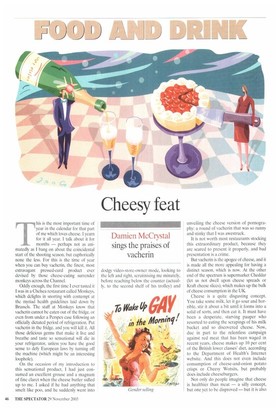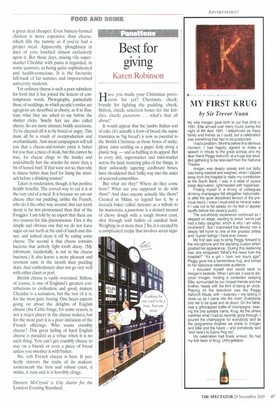Cheesy feat
Damien McCrystal sings the praises of vacherin
This is the most important time of year in the calendar for that part of me which loves cheese. I yearn for it all year. I talk about it for months — perhaps not as animatedly as I bang on about the coincidental start of the shooting season, but euphorically none the less. For this is the time of year when you can buy vacherin, the finest, most extravagant pressed-curd product ever devised by those cheese-eating surrender monkeys across the Channel.
Oddly enough, the first time I ever tasted it I was in a Chelsea restaurant called Monkeys, which delights in snorting with contempt at the myriad health guidelines laid down by Brussels. The staff at Monkeys know that vacherin cannot be eaten out of the fridge, or even from under a Perspex case following an officially dictated period of refrigeration. Put vacherin in the fridge, and you will kill it. All those delicious germs that make it live and breathe and taste so sensational will die in your refrigerator, unless you have the good sense to defy European laws by turning off the machine (which might be an interesting loophole).
On the occasion of my introduction to this sensational product. I had just consumed an excellent grouse and a magnum of fine claret when the cheese butler sidled up to me. I asked if he had anything that smelt like poo, and he suddenly went into dodgy video-store-owner mode, looking to the left and right, scrutinising me minutely, before reaching below the counter (actually, to the second shelf of his trolley) and unveiling the cheese version of pornography: a round of vacherin that was so runny and stinky that I was awestruck.
It is not worth most restaurants stocking this extraordinary product, because they are scared to present it properly, and bad presentation is a crime.
But vacherin is the apogee of cheese, and it is made all the more appealing for having a distinct season, which is now, At the other end of the spectrum is supermarket Cheddar (let us not dwell upon cheese spreads or Kraft cheese slices), which makes up the bulk of cheese consumption in the UK.
Cheese is a quite disgusting concept. You take some milk, let it go sour and horrible, stir it about a bit until it forms into a solid of sorts, and then eat it. It must have been a desperate, starving pauper who resorted to eating the scrapings of his milk bucket and so discovered cheese. Now, due in part to the relentless campaign against red meat that has been waged in recent years, cheese makes up 10 per cent of the British lower classes' diet, according to the Department of Health's Internet website. And this does not even include consumption of cheese-and-onion potato crisps or Cheesy Wotsits, but probably does include cheeseburgers.
Not only do people imagine that cheese is healthier than meat — a silly concept, but one yet to be disproved — but it is also a great deal cheaper. Even battery-farmed chicken is more expensive than cheese, which fills the tummy as if you've had a proper meal. Apparently, ploughmen in days of yore lunched almost exclusively upon it. But these days, mixing vile supermarket Cheddar with pasta is regarded, in some quarters, as being quite sophisticated and health-conscious. It is the favourite fall-back of fat nannies and impoverished university students.
Yet ordinary cheese is such a poor substitute for food that it has joined the lexicon of contemptuous words. Photographs, particularly those of weddings, in which people's smiles are egregious are described as cheesy, as if to illustrate what they are asked to say before the shutter clicks. Smelly feet are also called cheesy. So are more intimate bodily secretions. To be cheesed off is to be bored or angry. This must all he a result of overproduction and overfamiliarity. Anti-meat campaigners will tell you that a cheese-and-tomato pizza is better for you than a piece of steak, but this cannot be true, for cheese clings to the insides and undoubtedly furs the arteries far more than a bit of honest beef. If that were not so, then why is cheese better than beef for lining the stomach before a drinking session?
Taken in moderation, though. it has positive health benefits The correct way to eat it is at the very end of a meal. It is because we eat our cheese after our pudding, unlike the French, who do it the other way around, that our tooth decay is far less pronounced than that of the Froggies. I am told by an expert that there are two reasons for this phenomenon. First is the simple and obvious one that we do not leave sugar on our teeth at the end of lunch and dinner, and indeed clean it off by eating some cheese. The second is that cheese contains bacteria that actively fight tooth decay. (My informant, incidentally, is not in the cheese business.) It also leaves a more pleasant and resonant taste in the mouth than pudding does. And confectionery does not go very well with either claret or port.
British cheese is vastly overrated. Stilton, of course, is one of England's greatest contributions to civilisation and good, mature Cheddar is a sensation, but the rest of it is, for the most part, boring. One hears experts going on about the delights of English cheese (the Celtic fringe, for some reason, is not a major player in the cheese stakes), but for the most part it is a poor imitation of the French offerings. Who wants crumbly cheese? This great failing of hard English cheese is paraded as a virtue when it is no such thing. You can't get crumbly cheese to stay on a biscuit or even a piece of bread unless you smother it with butter.
No, soft French cheese is best. It perfectly mirrors the traits of its makers: underneath the firm and robust crust, it stinks, it runs and it is horribly clingy.
Damien McCrystal is City diarist for the London Evening Standard.



























































































 Previous page
Previous page